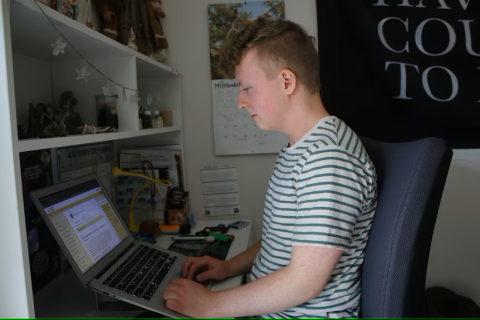
By Ashleigh Keating
Connor Winfield was a gifted student, so no one could understand why he found school so difficult.
Key points:
- Autism is the fastest growing disability in Australia, having increased by 25 per cent between 2015 and 2019
- Mainstream teachers often lack the training and resources to cater for the needs of neurodiverse students
- Experts and advocates are calling for autism-specific training to be mandatory for teachers
"I would bet that most of my teachers did not understand what autism was," he said.
Connor struggled with exams, deadlines, anxiety and most of all – bullying.
"By the end of Year 10 at my mainstream Catholic high school, I was attending probably two classes on one day a week."
Now 18 years old, Connor is one of more than 223,000 NDIS participants who list autism as their primary disability.
Sixty-nine per cent are aged between seven and 18.
Autism Spectrum Disorder, or ASD, is a developmental condition affecting how a person thinks, feels, and interacts with others.
It is Australia's fastest-growing disability: rates increased by 25 per cent in four years between 2015 and 2019.
The latest Australian Bureau of Statistics data suggests roughly one in 125 people are autistic.
But mainstream schools have not caught up with the rush.
Dr Amanda Webster, who specialises in autism and inclusive education, says any autism-specific training for teachers is given on an elective basis.(ABC News: Justin Huntsdale)
Classrooms lack training and resources
Autistic students often have different needs to their neurotypical counterparts, inclusive education expert Dr Amanda Webster said.
"Certainly teachers do not feel prepared to teach autistic students … students who don't fit the general mould," she said.
"Teachers feel very torn between wanting to get time to individually know their students, and the pressure to get higher outcomes, higher test scores, and often that results in a sort of generalist approach to teaching and learning."
Most university degrees offer a course on inclusive education, so that graduating teachers can meet their Australian Professional Teaching Standards.
"But it's only one semester, it's very general, and I do not feel it is meeting the needs [of autistic students]," Dr Webster said.
Any autism-specific training for teachers is ad hoc and opt-in.
"But the other problem is that we're not seeing [proper practice] in action," Dr Webster said.
"Teachers are going in and having practical experience, and they were seeing autistic students primarily being in segregated classes, not being catered for.
"And so that leaves a big impression that that's where those students belong, and teachers don't get any practice catering for [autistic] students."
Teachers not to blame
Teachers and schools have an obligation to provide inclusive education that meets the diverse needs of students, under the current Professional Teaching Standards and Disability Education standards.
Autism Awareness Australia director Nicole Rogerson says mainstream schools are failing autistic students.( ABC News: Simon Amery )
But advocacy group Autism Awareness Australia (AAA) said many mainstream schools were failing.
"It's not that they're refusing to support these students … often they just don't have the skills and don't understand what those accommodations need to be," AAA director Nicole Rogerson said.
"They also might have 29 other students in their class, so we know that the system as it's designed at the moment is never going to work."
Ms Rogerson said the current system could leave autistic students "traumatised" by "staggeringly high" rates of school expulsion and suspension, which also contributed to an increase in homeschooling and school refusal.
"It sends a message to the child that they are not worthy, and they don't have a home in their local mainstream school," she said.
'Autism knowledge gap' to widen
It is unclear how the government is going to address the autism knowledge gap.
In the final report from the Disability Royal Commission, commissioners were divided on the future of special or segregated education, with some calling for it to end by 2051.
Research suggests children with disability fare better in inclusive mainstream education, and able-bodied students educated alongside those with disability hold fewer prejudicial views.
The latest ABS data shows one in five autistic students attend a special school, and two in five attend a special class.
NDIS Minister Bill Shorten says the scheme "can't be the surrogate school system" for autistic students.(Getty: Sam Mooy)
AAA said mainstream schools would need "a massive systemic change" to compensate for the services special schools provided.
NDIS Minister Bill Shorten has also joined calls for the education system to better support the more than 235,000 people under 18 who have joined the scheme with autism or developmental delays.
Mr Shorten last week said the NDIS "can't be the surrogate school system" for autistic students, after flagging changes to the way they will be supported, in an effort to make the $40 billion scheme more sustainable.
"That's all well and good to suggest that, but we also have a mainstream school setting that is not set up to accommodate them," Ms Rogerson said.
"There are going to be some big real time ramifications for this in the state education department I think we have a terrible situation at the moment but I think it's going to get a lot worse."
Simple solutions
Connor Winfield says teaching degrees should automatically include instruction for educating neurodiverse students.( ABC News: Jade Toomey )
For Connor, the solution is simple:
"Teaching degrees should just automatically include courses on how neurodiverse students can be supported," he said.
South Australia has taken a broader approach, becoming the first state to appoint an assistant minister for autism.
The state also introduced hundreds of specialist autism inclusion teachers in 2023, with the aim of increasing teachers' skills.
see also: